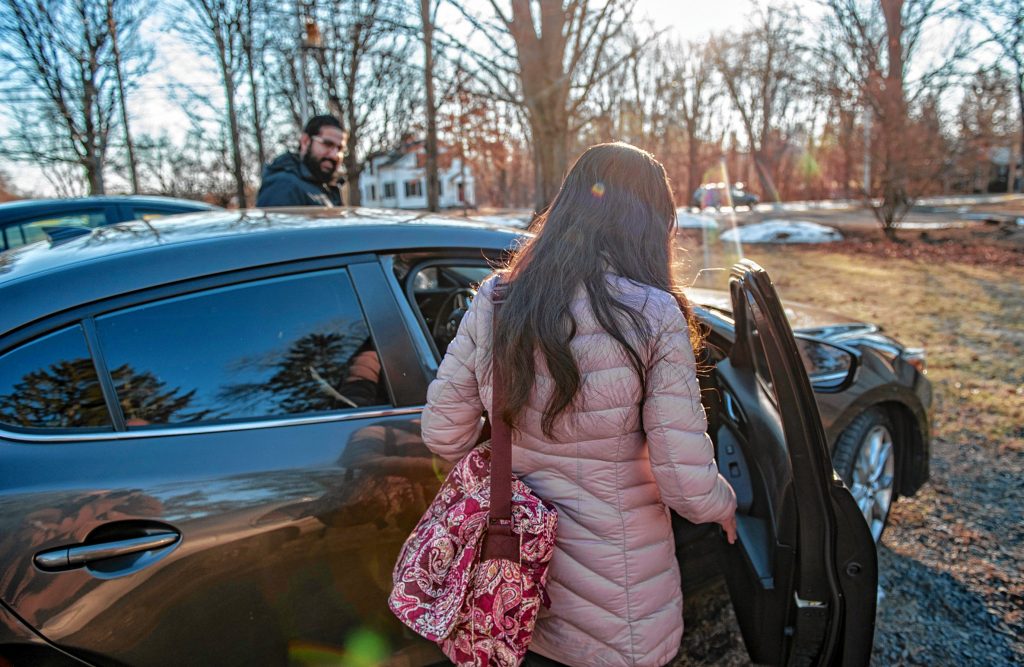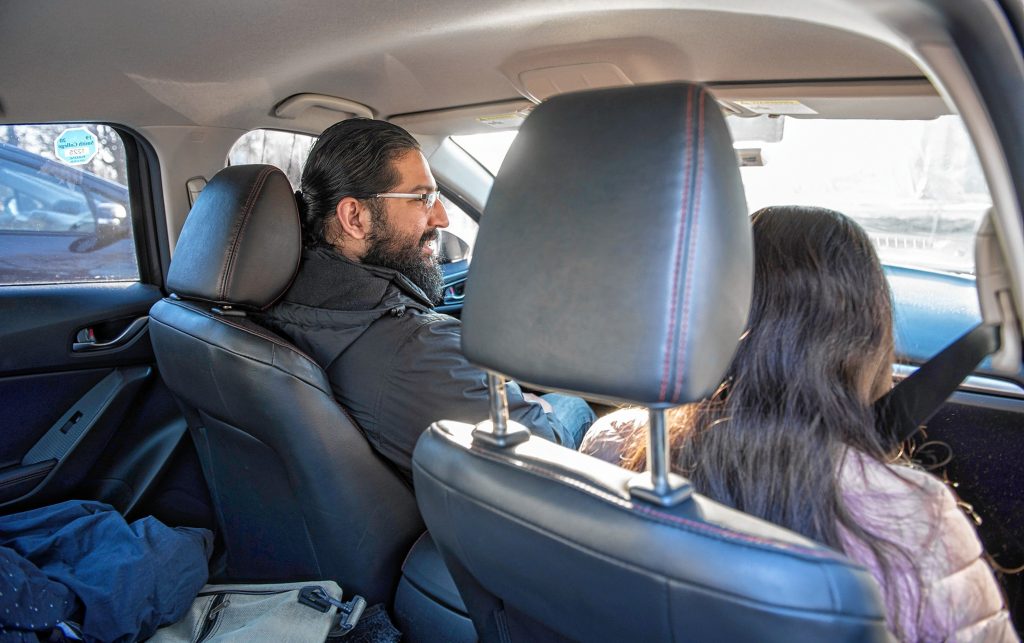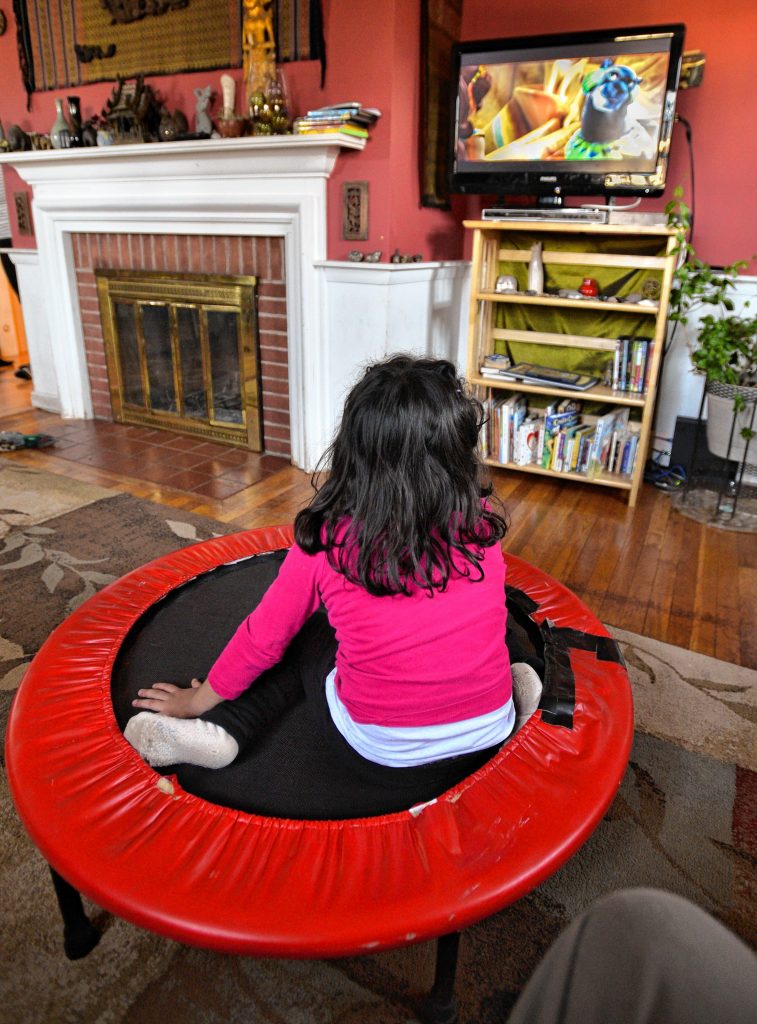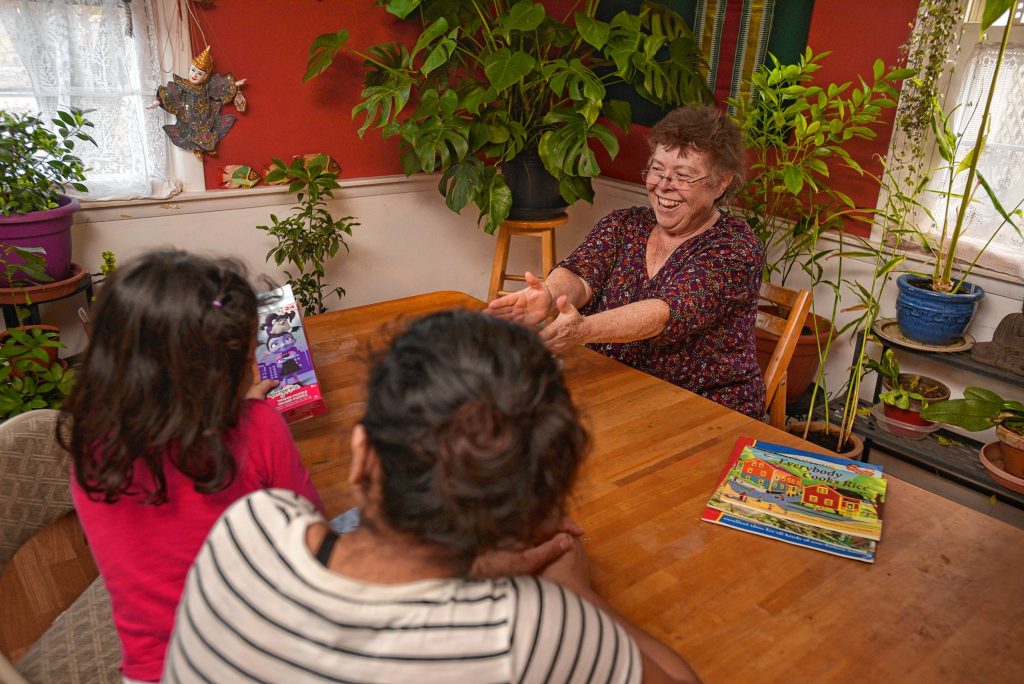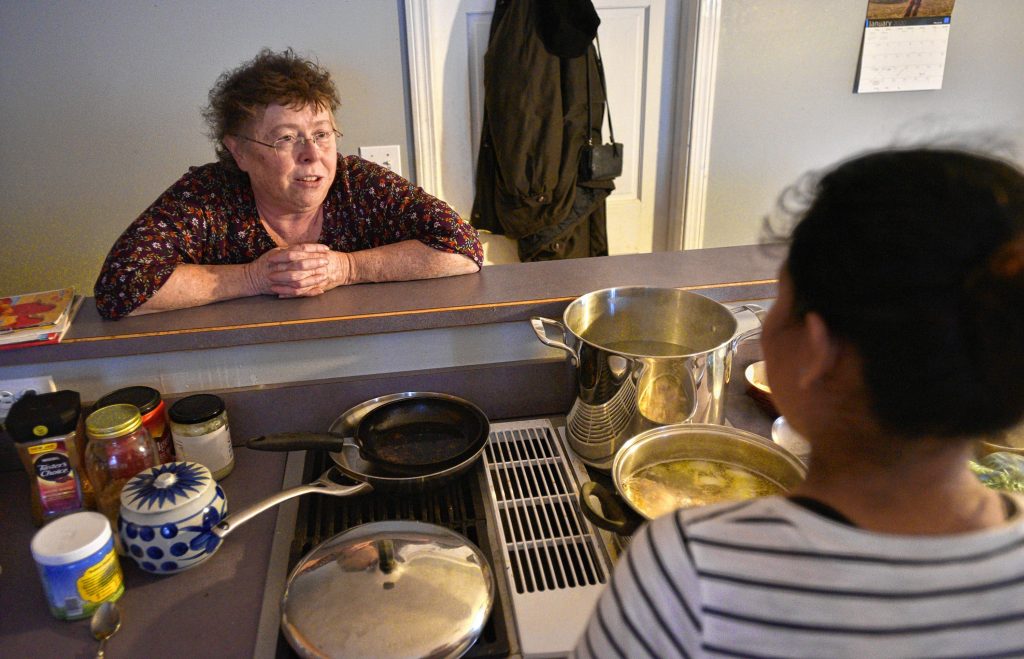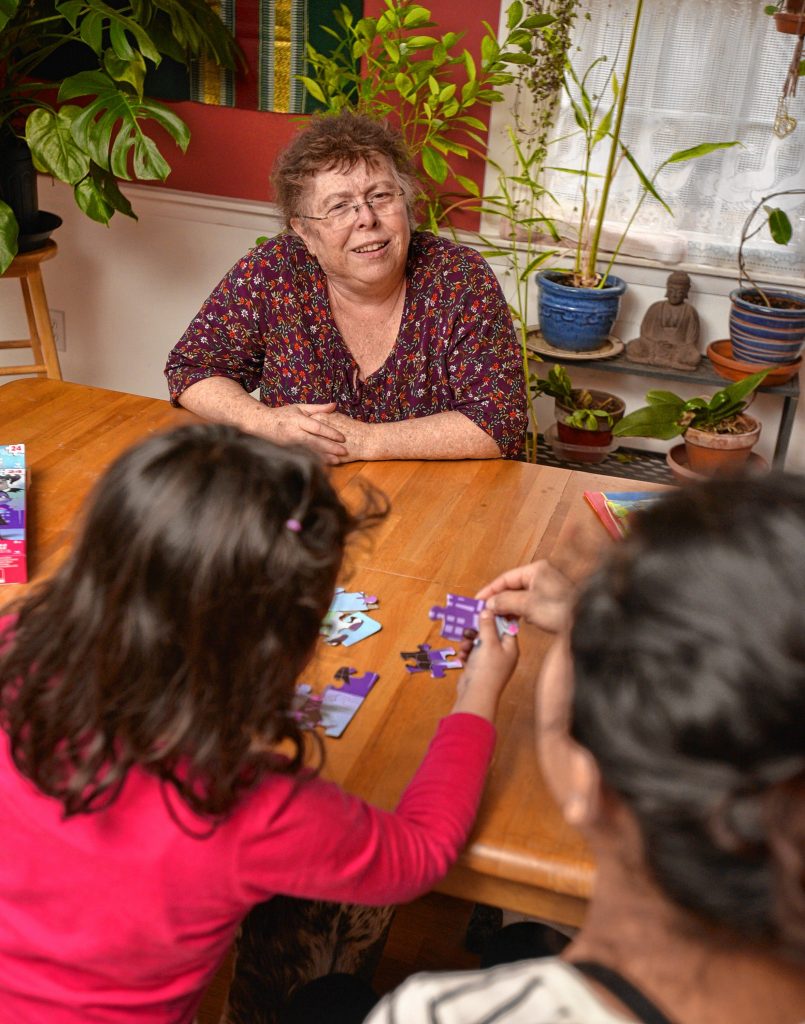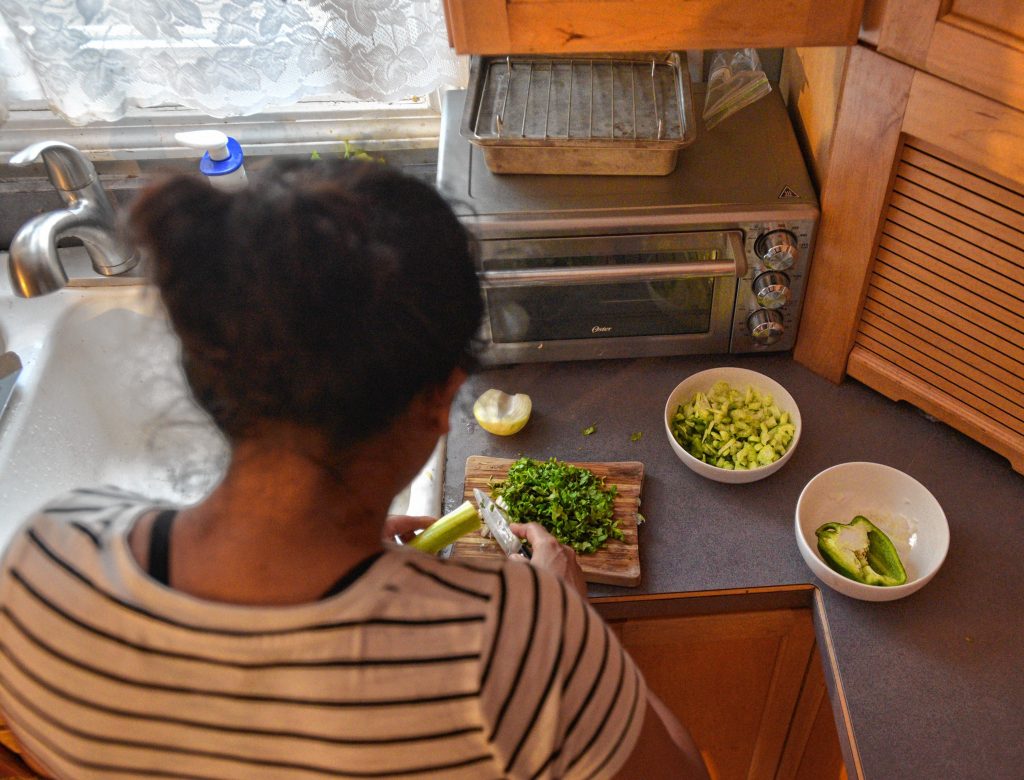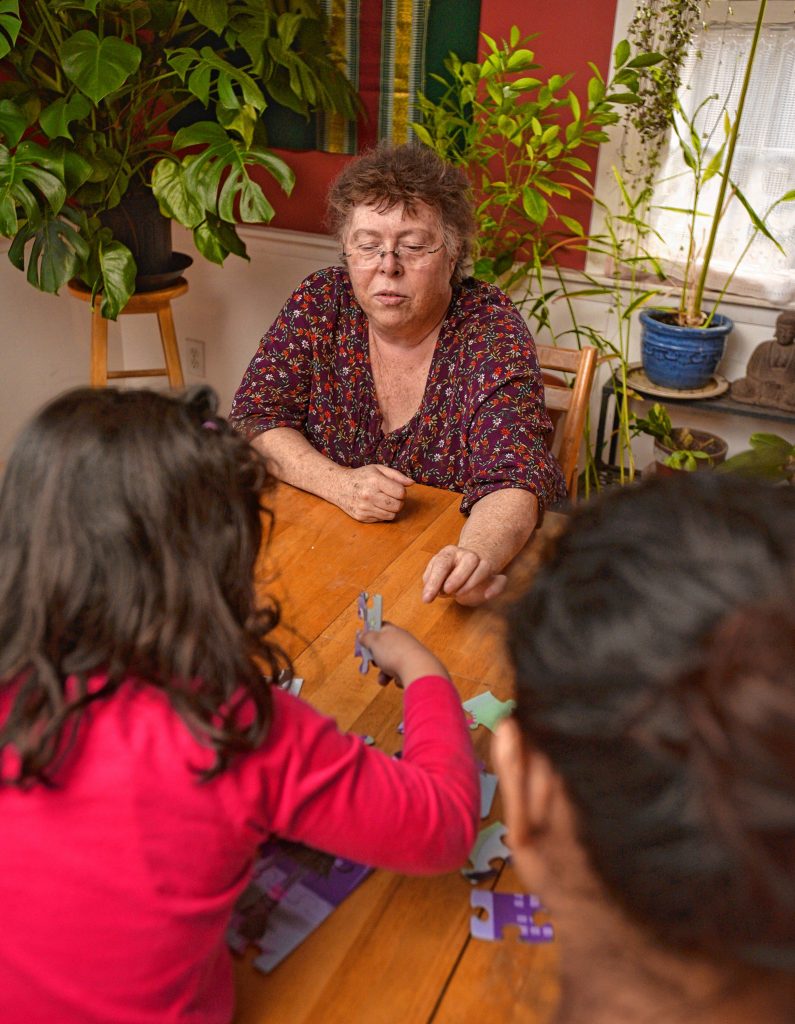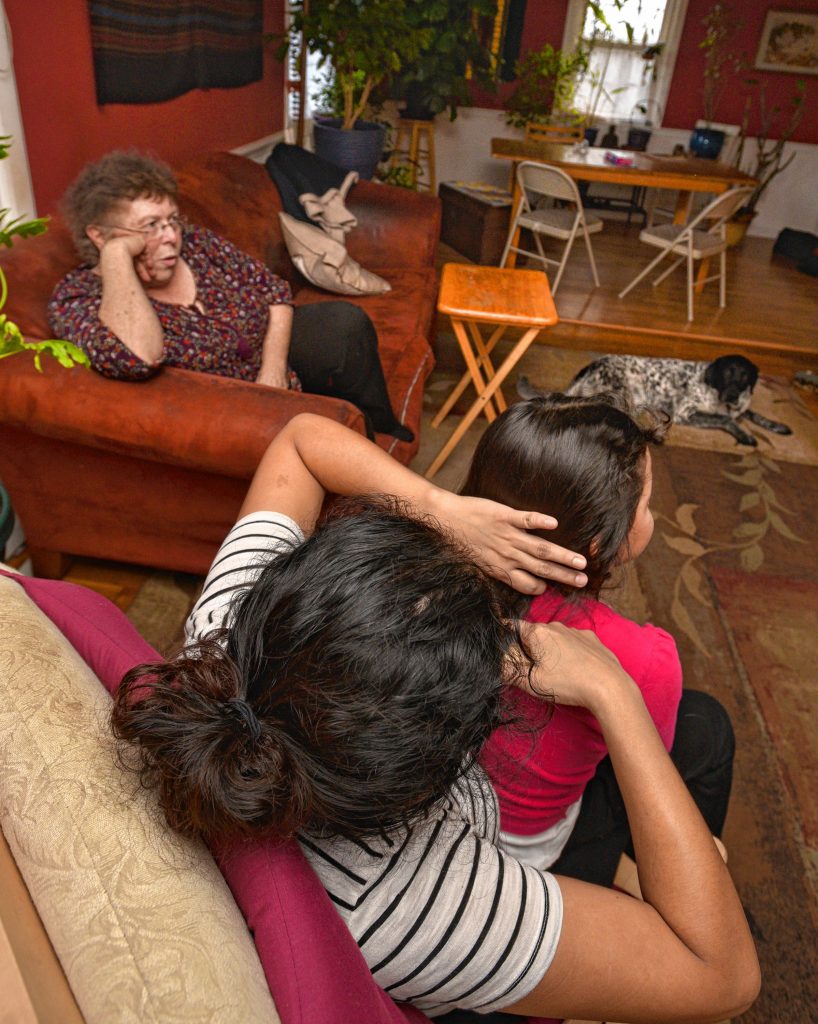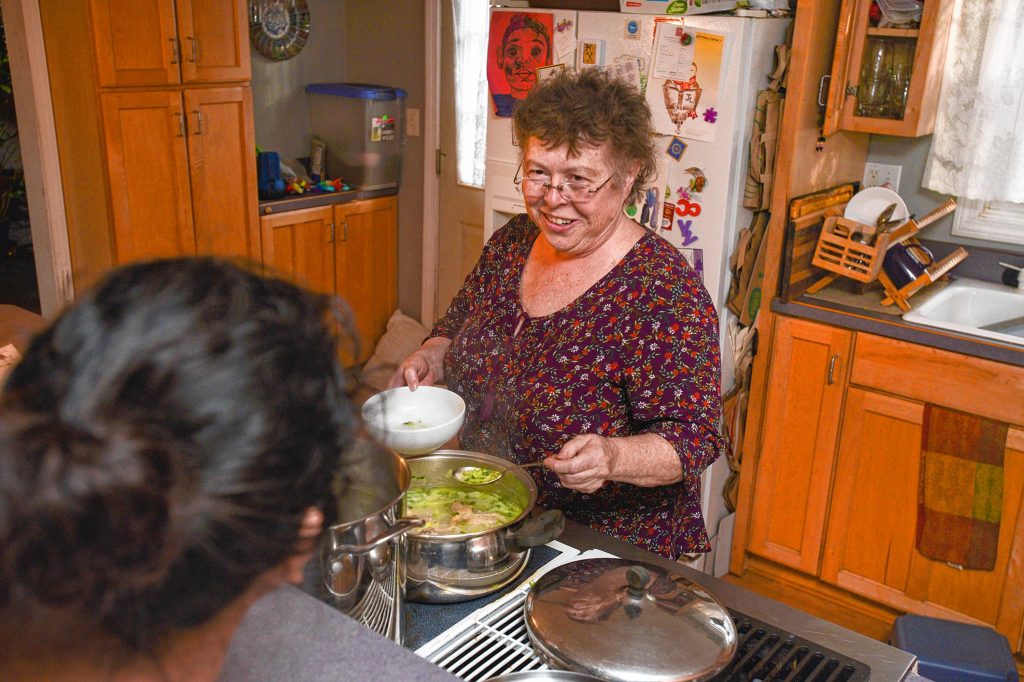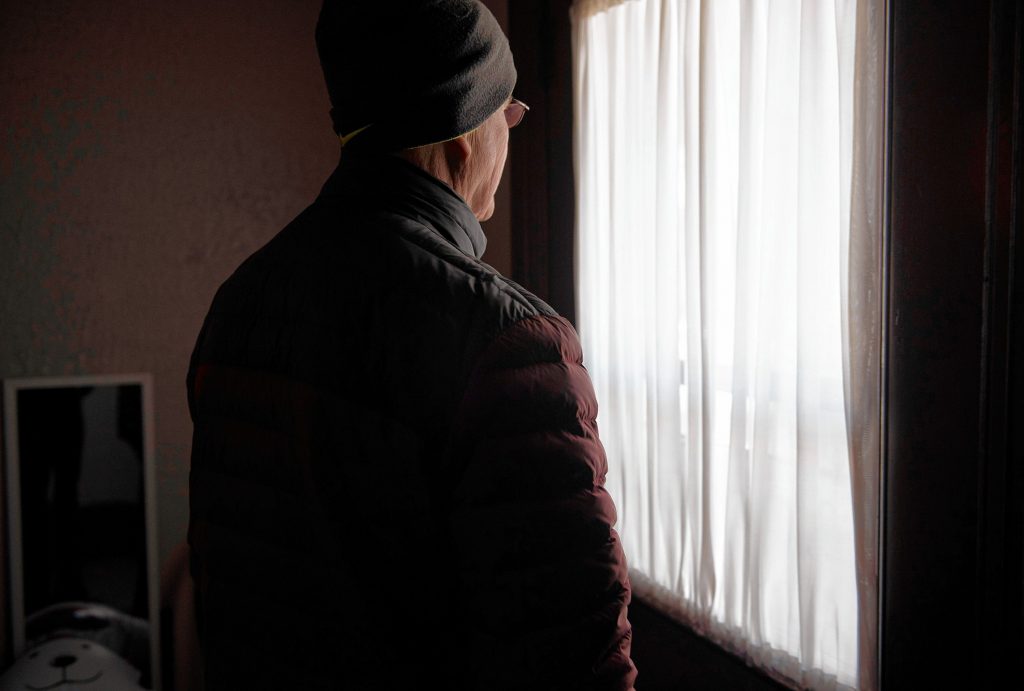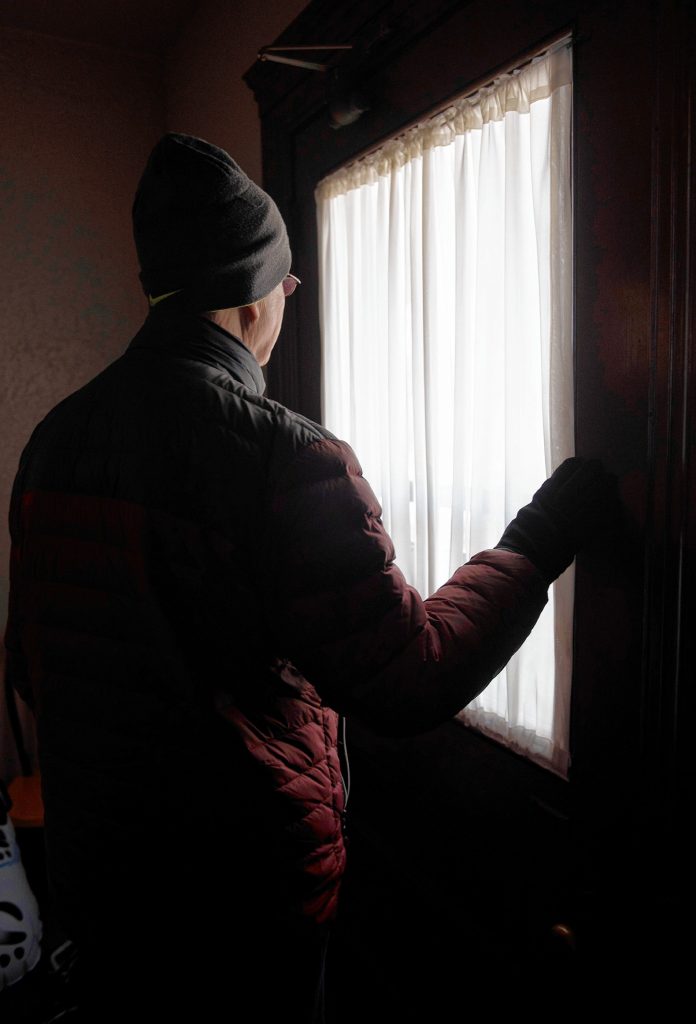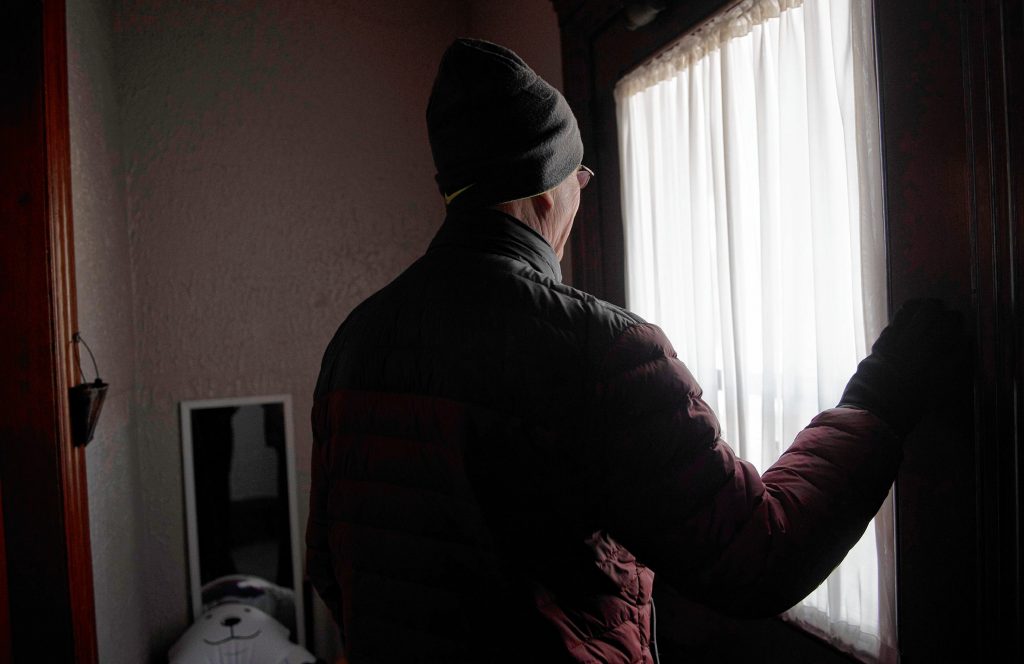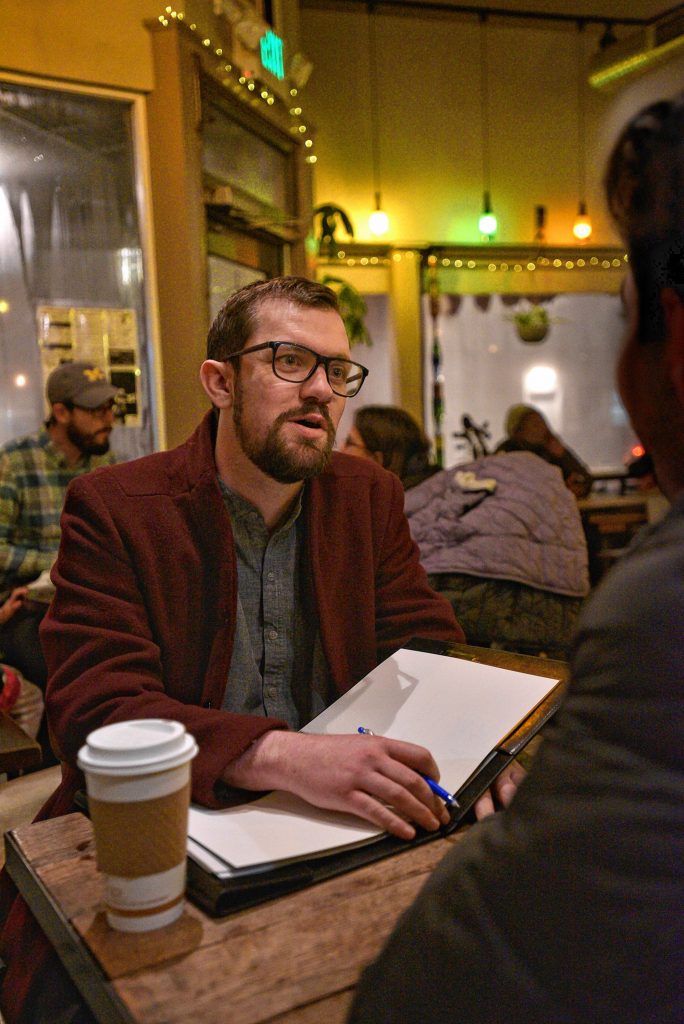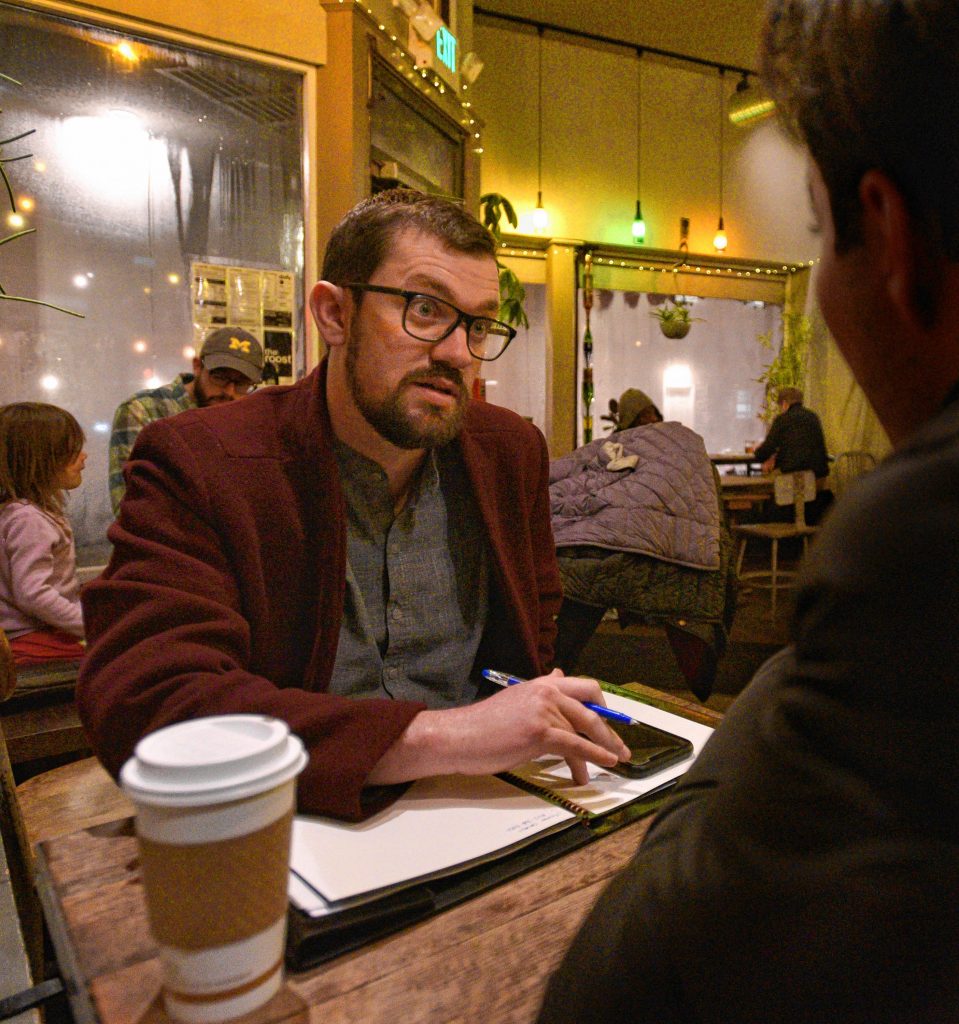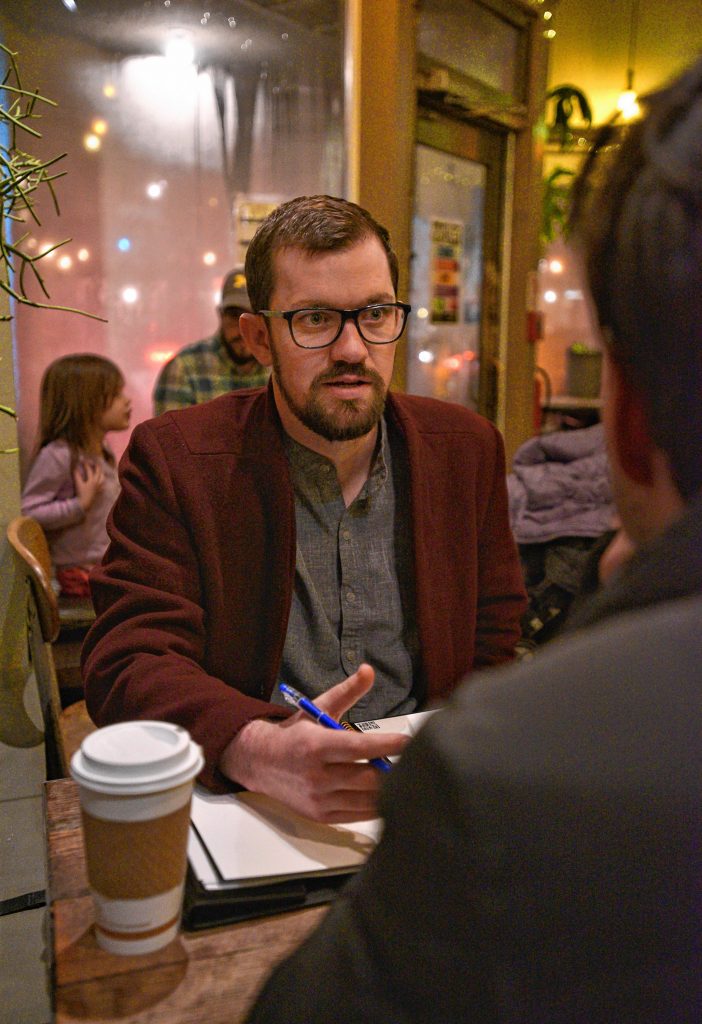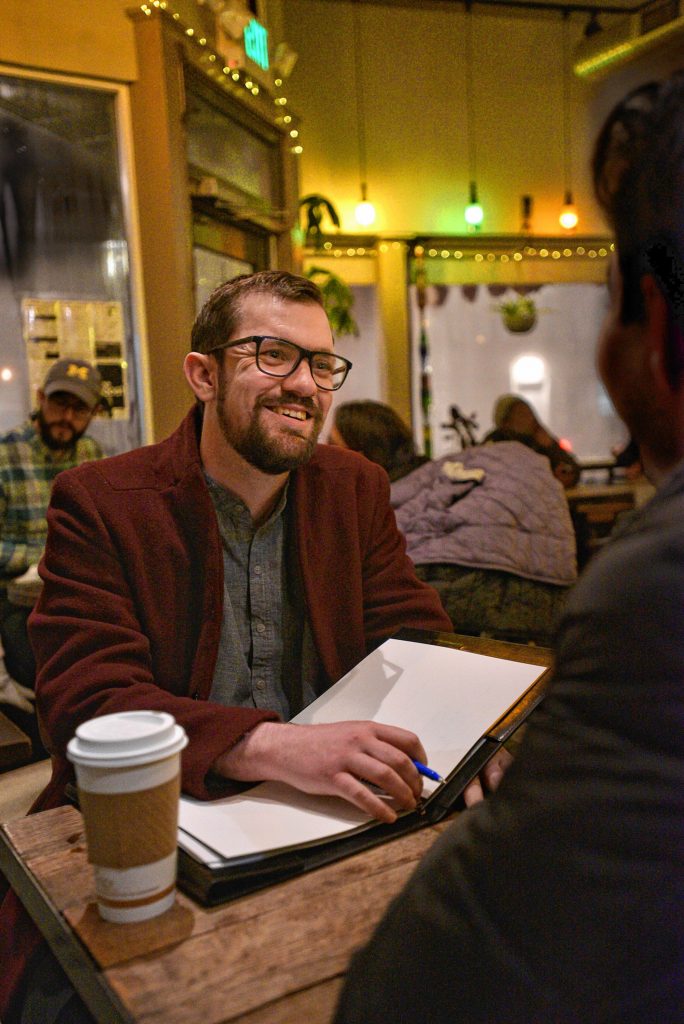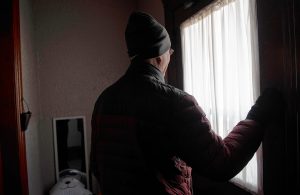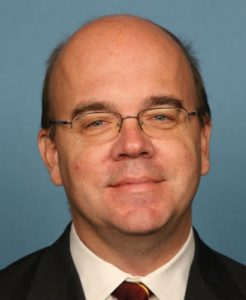Editor’s note: Due to the dangers facing those seeking asylum and their families in their home countries, as well as the sensitive nature of their legal cases, the Advocate is using pseudonyms Valentina, Isabel, Ramon, and Santiago for asylum seekers featured in this story and refraining from naming their countries of origin. The Advocate is also withholding the last names of Valley residents Lynne and Ted, to protect the asylum seekers they are housing.
Within weeks of learning there are asylum seekers coming to western Massachusetts fleeing violence in their home countries, Lynne, a longtime local resident who teaches English to immigrants, agreed to bring two into her home to live with her.
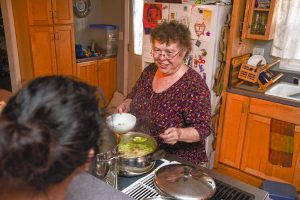
Lynne, right, talks with a woman she has given asylum to in her home, Thursday, Jan. 30. Jerrey Roberts photo
Now, Lynne is a sponsor for Valentina and her young daughter Isabel, both from Central America. They became connected through the Western Massachusetts Asylum Support Network (WMASN), an all-volunteer group that helps resettle asylum seekers in Massachusetts. She heard about the small family in need after meeting a different asylum seeker through her work.
“She was the first person I had met who was an asylum seeker so far from the border,” Lynne said. “We read about what is going on at the border and we are horrified, but I didn’t know that there was anybody making their way all the way up to New England…. She pulls out her phone and shows me a picture of a friend she had met in the shelter in Tijuana and her 3-year-old daughter and said ‘my friend needs a place to stay.’”
Asylum status in the United States is similar to a refugee in that it may be granted for individuals who have been persecuted or fear they will be persecuted on account of race, religion, nationality, and/or membership in a particular social group or political opinion, according to the U.S. Citizenship and Immigration Services (USCIS). The key difference is asylum seekers are already in the U.S. or are seeking admission at a port of entry; individuals can only seek refugee status from outside of the U.S.
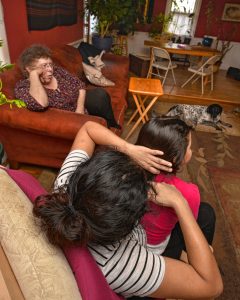
Lynne, top, relaxes in her living room beside a woman and her 3-year-old daughter she has given asylum to, Thursday, Jan. 30. Jerrey Roberts photo
Lynne wanted to learn more about what hosting asylum seekers would entail, so she reached out to Jonathan Jenner of Northampton, a volunteer with the WMASN.
“That was a hard decision to make — to actually host somebody — because I am a very private person,” Lynne said. “I wasn’t sure if it would be a good idea and I thought, and thought, and thought. And something is pushing me. Something, I can’t even explain it, but it said, ‘Do it.’ ”
Lynne is now a member of the WMASN herself. The network provides assistance to asylees and asylum seekers in a variety of ways: establishing relationships between asylum seekers with sponsorships, transportation, and community building once settled in the Valley.
As Lynne saw it, her house could be a good place to host Valentina and Isabel: she lives near a bus stop, she has an empty room since Lynne’s daughter left for college, and she can speak Spanish. Plus, she added, she has experience helping immigrants get acclimated to United States culture.
“I figured I am in a pretty good position to help out here,” Lynne said.
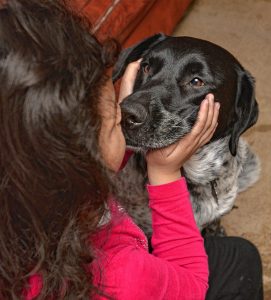
A 3-year-old girl who has been given asylum by Lynne spends time with Lynne’s dog, Penny, Thursday, Jan. 30. Jerrey Roberts photo
Soon after Lynne agreed to become their sponsor, Valentina and Isabel were released from custody in California and got on a plane headed for the Northeast.
“All of a sudden, there is a mother and child at my doorstep at midnight,” Lynne said. “And the next day we were up and running. There was so much we had to do.”
The Advocate asked Valentina to provide her perspective, but her lawyer advised her not to speak on the record, as her asylum case is still pending.
During their first day, Lynne brought Valentina and Isabel to a local food shelter and signed them up for monthly boxes of food. They walked out that day with a large box and then headed to a Salvation Army store, which provided them with $60 vouchers for clothing for each of them, part of a program to assist vulnerable individuals.
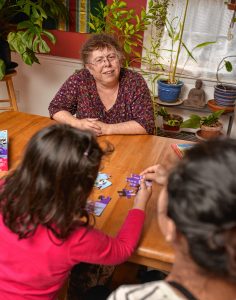
Lynne, top, talks to a woman and her 3-year-old daughter who she has given asylum to in her home, Thursday Jan. 30 as they put a puzzle together. Jerrey Roberts photo.
Valentina and Isabel had to leave most of the few possessions they had when they left California because their flight tickets only allowed them to bring a small backpack each. Lynne explained that they were lucky to get on that plane at all — immigration officials nearly forced her back into Mexico, but at the last minute released them into the United States.
While the three of them were eating lunch at a restaurant that first day, a woman sitting nearby with a small child began talking to Lynne and Valentina, and had an idea when she discovered that Valentina was an asylum seeker.
“She said, ‘I am part of an email network for moms,’ “ Lynne recalled the woman saying. “‘Let me see if I can put a call out, tell me what you need.’ ”
That evening, the woman arrived with boxes and bags full of games, toys, clothes, and food, Lynne said.
“My guest [Valentina] was in tears,” Lynne said. “She couldn’t believe that people were so happy to help. My sister arrived with bilingual books for the little girl. People were asking, ‘What do you need? What can I bring you?’ It was a really good first day.”
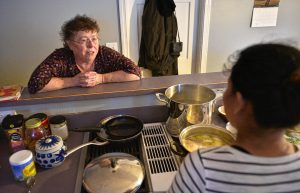
Lynne, left, talks with a woman she has given asylum to as she makes dinner in her kitchen, Thursday, Jan. 30. Jerrey Roberts photo.
Valentina fled her country nearly two years ago due to a domestic violence situation, according to Lynne. In June 2018, then-Attorney General Jeff Sessions announced that domestic violence survivors and those fleeing gang violence would no longer be eligible for asylum status in the U.S. By December, a federal court had blocked the Trump administration’s attempts to deny asylum seekers for those reasons.
Valentina and Isabel are currently in the initial stages of their immigration court case. Their first hearing will take place in October, and in the meantime, she has to visit ICE offices every few months.
With the help of the WMASN, Valentina and Isabel are attempting to become part of the larger community.
“I was so proud to live in a community that really cares,” Lynne said. “I think what it says is that there is a lot of pent up frustration here with the situation at the border and people feeling helpless … If there are people feeling frustrated because it seems like there is nothing you can do to change the situation, and the way people are being treated at the border, you can act locally.”
She added, “I think we are in a good place to host asylum seekers (in western Massachusetts) and they are overwhelmed in the places along the border. So, to me, I think it would be a good idea to bring them here and do our very best to make them welcome here.”
Building a support network
Western Massachusetts residents Elliot Oberholtzer and Jenner went down to the southern border in December 2018 as part of an effort organized by the New Sanctuary Coalition in New York City whose mission is to end deportations and provide support for individuals navigating the U.S. immigration system.
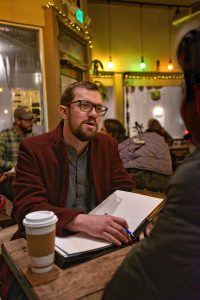
Jonathan Jenner, who is a volunteer for Western Massachusetts Asylum Support Network, talks with a client, Thursday, Feb. 13, 2020, at The Roost in Northampton. Jerrey Roberts photo
That was during the height of the migrant caravan traveling from Central American countries. The caravan reportedly began in October 2018 by a group of about 160 Hondurans that left the town of San Pedro Sula — which has been referred to as the “murder capital of the world.” By some estimates, the caravan grew to about 4,000 to 7,000 people.
During that time, Jenner spoke with immigrants at the border, witnessed the situation, and informed people about the asylum-seeking process and handed out flyers.
“We never tell people what to do,” Jenner said. “We are not lawyers; no part of what we do is legal aid. We try to put people in the best possible position to make decisions that only they can make. We can’t imagine what it is like to leave your house in the middle of the night.”
Oberholtzer and Jenner returned to the area motivated to create an inviting community for asylum seekers to live. They established WMASN informally in February 2019, and by May 2019, had retained fiscal sponsorship from the Peace Development Fund, which is based in Amherst. The group has now grown to include 70 volunteers, and there are 16 sponsors including Lynne who have sheltered asylees and asylum seekers to date.
“Part of what came out of that mobilization was the commitment by all of us to then return home and build welcoming communities,” Oberholtzer said. “The Western Massachusetts Asylum Support Network is our envisioning of how to support a welcoming community.”
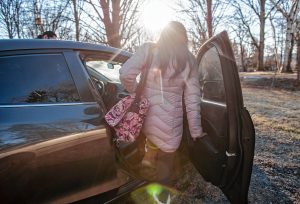
A woman in the process of seeking asylum gets a ride with a Western Massachusetts Asylum Support Network volunteer to take her to the Immigration and Customs Enforcement office in Hartford from Hadley on Wednesday morning, Jan. 29, 2020. Kevin Gutting photo.
For asylum seekers who establish a sponsorship with somebody in the United States, they can be released from detention and continue the asylum-seeking process while living in the country. Sponsors are U.S. citizens or legal permanent residents who submit paperwork to U.S. Immigration and Customs Enforcement (ICE) to secure an asylum seeker’s release and commit to housing an asylum seeker upon their release.
Sponsorships not only provide shelter and food, but also build a community for asylees and asylum seekers in a country where they often do not know anybody.
“Our mission is to provide a welcoming place to land and a network of broad-based accompaniment support for individuals who are navigating asylum cases and want to or currently are residing in Western Mass,” said Oberholtzer.
The WMASN’s work also encompasses providing financial assistance with the numerous fees associated with the asylum-seeking process, connecting individuals with legal support, providing child care services, and a rideshare program to various appointments with ICE, medical services, grocery shopping, and getting to work.
WMASN works with both individuals granted asylum and those in various stages of the process. The organization has also partnered with legal aid and legal advocacy organizations such as Transcend Arizona, a grassroots group working to support the LGBT community in immigration and detention centers, and the Southeast Immigrant Freedom Initiative, which is affiliated with the Southern Poverty Law Center and provides pro bono legal representation to detained immigrants.
“Ideologically, the things that underlie our project are what we believe politically: we believe that migration is a human right, we believe that there is an international guaranteed right to asylum that has been in place for decades, and that seeking asylum is not illegal,” Oberholtzer said.
An important facet of the WMASN’s work is connecting asylum seeking individuals, many who are in detention or about to go into detention, with people living in western Massachusetts that have volunteered to shelter and feed immigrants for the duration of their immigration court case.
Many of the asylum seekers that the support network helps to re-settle in the Valley were ones volunteers met personally at the border. WhatsApp, a messaging application, is a vital means of keeping in contact. ICE has a website to track people while in detention where volunteers can monitor asylees moving from different detention centers.
A broad, national network of law firms, non-profits, and similar support networks, along with word of mouth among asylum seekers, are other ways that people get connected to the WMASN.
“There are a lot of people in Tijuana, not just from the Northern Triangle countries, but from all over the world,” said Jenner, referring to Guatemala, El Salvador, and Honduras. “And there’s a good number of people who we’d ask them about a sponsor or getting people resources for legal aid once in U.S. detention. And there were people who didn’t have sponsors. We got to know them there, we know a wide set of people here, and one thing we have done is to work to connect those folks. Let them get to know each other and establish a relationship that can become the basis of sponsorship.”
Valentina and Isabel — along with Santiago and Ramon, both subjects of the first installment in this series — are among 21 asylum seekers and asylees from 11 different countries who the WMASN has helped find housing in the area.
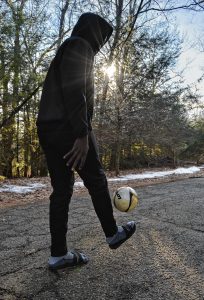
Ramon, who has received asylum status, dribbles a soccer ball, Monday, Feb. 3, 2020. Jerrey Roberts photo.
Ramon, of West Africa, met Jenner while both were in Tijuana. He is a rare example of someone who won his asylum case without legal representation, Oberholtzer noted. Only 16 percent of unrepresented asylum applicants received asylum between October 2018 and September 2019, according to Transactional Records Access Clearinghouse (TRAC), a data research center at Syracuse University.
“When talking about who wins their cases, it has almost nothing to do with the actual content of the case and almost everything to do with access to an attorney and luck of where that case is adjudicated,” Oberholtzer said.
Ramon said life has been difficult since getting out of detention and being granted asylum. Experiencing a winter for the first time, adjusting to a different lifestyle in a foreign country, and simple things like learning to cook with unfamiliar foods have all posed challenges.
“It’s not really easy, but I am getting better every day,” Ramon said. “With the help of the network and my housemates, it’s been gradually getting better.”
Even after escaping an authoritarian government in Central America, and then spending three months in U.S. detention, Santiago’s future — and safety — remains shrouded in doubt.
“I lost everything because I had to leave the country,” he said.
Santiago does not know how long he will be allowed to live in the United States, but for now, he is living with members of his family. His next immigration hearing will take place in the fall.
He recently moved into an apartment in the Valley with family relatives — who are all asylum seekers themselves — and it will be up to an immigration judge whether or not he is allowed to remain in the country.

Santiago holds a crucifix at his apartment, Tuesday, Feb. 11, 2020, that a friend gave him while they were in detention together. Jerrey Roberts photo
“The idea is to establish ourselves,” Santiago, who is taking English classes, said in Spanish. “The people in (western Massachusetts) have been phenomenal and spectacular to us, because they have been able to open doors for us, and overall, the amiability and the unconditional support they have shown us.”
His relatives (who he asked not to name) fled their country in spring 2019 because the government began harassing them when they could not find Santiago.
“The government began questioning (them),” Santiago said. When his family member went to a hospital when they were ill, the government began questioning them about Santiago’s whereabouts. They threatened his relative, Santiago said, and they had to leave their job and country.
Santiago’s relatives declined to be interviewed by the Advocate.
“I told (them), I can try to help (them), let me talk to the group,” he said referring to the WMASN. “Thanks to their help, they found a person that could provide a roof for (my family) and (they were) able to get here.”
In addition to help in finding housing, Santiago said the WMASN has given him and his family members moral support which he described as “invaluable.”
“There is always someone saying, ‘You are not alone,’ or ‘You can count on me,’ ” Santiago said. “One always has post-immigration stress after leaving one’s country, but it’s good to know there is always someone to talk with in many situations.”
Sympathy between immigrants
In addition to its own volunteers, WMASN also finds other members of the community willing to assist asylum seekers in different ways. In searching for housing for Santiago and his family, the organization found a landlord sympathetic to the family’s situation.
Ted, who asked the Advocate not to use his last name in part to protect Santiago and his family, is a local property owner with apartments for rent. He learned of Santiago’s troubles with his country’s government and decided he wanted to make his transition to western Massachusetts smoother by reducing the cost of rent for a year.
The story of Santiago and his family fleeing persecution resonated on a personal level for Ted. In the early 1940s, his family was forced to live in a labor camp in Nazi Germany for three years.
“I put myself in their shoes (because) when I lived in Germany, me and my family, as well as everyone else there, were considered to be stateless,” Ted said. “That was because my parents were taken out of Poland into forced labor into Germany, and of course, they endured the abuse there by the Germans.”
The Soviet Union liberated prisoners of labor camps towards the end of World War II, like the one in which Ted’s family was being held, but conditions were still very difficult.
“And then they were afraid to go back to Poland because Stalin and his folks were pretty ruthless there in Poland,” Ted said.
His grandparents came to the United States in 1952, and in 1961 Ted and his parents moved to western Massachusetts through a church sponsorship. At 13, Ted crossed the Atlantic Ocean by boat and arrived at Staten Island, New York, with all their belongings and not much else.
“We were totally broke — no money — all we had were what my grandparents had sent us to travel,” Ted said. “When we got off, and went through processing. We were left standing there, speaking no English.”
Ted said he felt an immediate connection to Santiago when the two met in January, describing him as having a “very humble presentation of himself.” He felt Santiago was genuine, someone truly in need of some help, for himself and his family.
Reflecting on his own experience as an immigrant who did not speak any English when he arrived, Ted said the Valley felt like the ideal place to live as he found a welcoming community for refugees. He thinks that is still the case today for asylum seekers like Santiago, because of the region’s acceptance for diverse populations.
“That’s what makes the Valley unique,” Ted said. “And we should be proud of that.”
Other needs
Establishing relationships between asylum seekers and sponsors in western Massachusetts encompasses only one facet of the WMASN’s work, according to Oberholtzer.
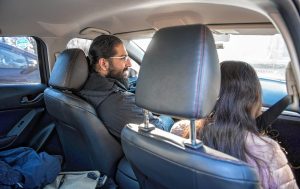
Western Massachusetts Asylum Support Network volunteer Osman Keshawarz, left, gives a ride to a woman in the process of seeking asylum, from Hadley to the Immigration and Customs Enforcement office in Hartford on Wednesday morning, Jan. 29, 2020. Kevin Gutting photo
“Our focus is on supporting people through their asylum cases with whatever they need,” Oberholtzer said. “And a lot of that looks like various accompaniment services such as ride shares, supporting with child care.”
Jenner added, “People’s social needs, some people offer language classes, finding ways to get people involved in the really hard work of rebuilding a life. Getting kids in school, playing soccer, getting therapy.”
Osman Keshawarz, a graduate student at the University of Massachusetts Amherst studying economics, became a volunteer with the WMASN this past summer. Keshawarz said he had previously been involved with immigrant rights activism in his hometown of Hartford, Connecticut, and he “jumped at the chance” to get involved with the network locally.
Keshawarz helps asylum seekers with transportation — getting them to their appointments and their check-ins with ICE, which are usually in Hartford and sometimes in Boston. Other common trips include driving them to English classes and to pick up groceries.
“And definitely a need for social time,” Kershawarz said. “Volunteers come to hang out, some with young children. It’s invaluable to have social time. Some (asylees) are completely overwhelmed by the experience, and there are some volunteers that can come and hang out and cook a meal together.”
The monthly trips to ICE offices for check-ins can be a challenge, Kershawarz said, because wait times are often unpredictable as they can range from half an hour to up to five hours.
“It’s a huge barrier to have for those who are permitted to work,” he said. “It’s a huge barrier to getting employment.”
Advocating for asylum seekers in Congress
Last July, U.S. Rep. Jim McGovern, whose district encompasses much of western Massachusetts, saw conditions for migrants first-hand at a detention center in McAllen, Texas. He said many of them were crowded in standing-room-only cells and deprived of basic hygiene essentials like showers or toothbrushes, often for 60 days at a time.
Many of the conditions that Ramon and Santiago described experiencing in custody in Part 1 of this series — meager meals, lights kept on day and night, men sleeping on concrete — matched what McGovern had witnessed himself.
“It’s unbelievably cruel,” McGovern told the Advocate. “I think we are violating our own laws, and international laws, in the way we are treating people, who in many cases, are fleeing for their lives. I’ve been to the border a couple times, and what I witnessed at the border is shocking.”
McGovern questioned how policies such as Remain in Mexico — stopping asylum seekers from entering the country — and the separation of parents from their children could be in compliance with international laws for asylum.
“Fear of persecution means they are allowed to present their case and whether they can remain here,” McGovern said. “Remain in Mexico denies that right.”
Even though last month a federal appeals court found Remain in Mexico to be legally invalid, on March 12, the Supreme Court allowed the administration from continuing to enforce the policy. The lower court’s ruling would have blocked the policy on that day in two states, but the high court ruled it could remain in force.
The next step for the administration is to file a formal appeal with the Supreme Court, which may not be considered until the fall.
“This president thinks he can do whatever he wants, he thinks he is not accountable to Congress or courts,” McGovern said. “I think that his strategy is to make it so awful for anyone to come to the U.S. that even people fleeing for their lives will think twice.”
Not only did McGovern witness conditions migrants in detention are forced to live in, but he and a congressional delegation of 11 other lawmakers — including Speaker Nancy Pelosi — traveled to Central American in August to better understand the conditions for why families are fleeing the region.
McGovern and the delegation met with high-level representatives from Guatemala and El Salvador in an attempt to understand the violence, corruption, and poverty in Central American countries.
He recalled meeting a man from El Salvador, who wanted to apply for asylum in the United States, because he could not escape from powerful gangs in the country no matter how many times he would relocate.
“He relocated to another town in El Salvador — which is a country about as big as Massachusetts — and he talked about getting on a bus and seeing one of the gang members who threatened him,” McGovern recalled. “You can’t just relocate from town to town or city to city. Gangs are everywhere, and the reality is, police don’t care. They are paid off and corrupt.”
McGovern said ending the Trump presidency is one of the only ways to amend the broken immigration and asylum laws in the country. The executive branch of government has a lot of control over immigration rules under the Department of Homeland Security and Department of Justice, and McGovern said the Trump administration is using their authority to be as cruel as possible.
“I make an appeal to Trump to start acting like a human being,” McGovern said. “It’s not who we should ever aspire to be where we treat people so cruelly … We will look back at this moment with great shame.”
Luis Fieldman can be reached at lfieldman@valleyadvocate.com

